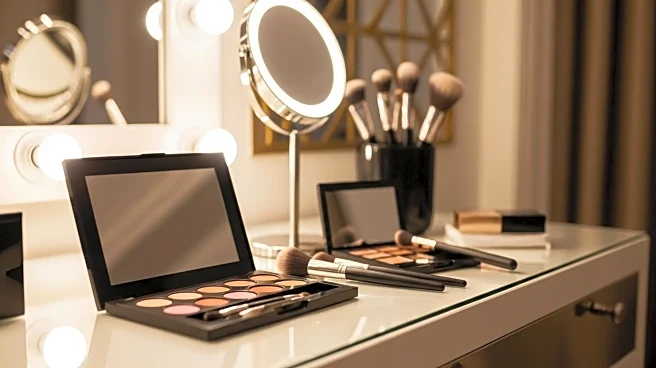What's Happening?
During President Trump's visit to the Knesset, Israeli makeup artist Yair Poliker had an unexpected opportunity to provide a touch-up to the U.S. President. Poliker, who was initially at the Knesset to prepare journalist Ayala Hasson, encountered President Trump by chance. The makeup artist used a transparent powder to neutralize the orange tone of Trump's skin and styled his hair for a uniform look. Poliker described the encounter as a highlight of his career, noting the positive energy and smiles exchanged during the brief session. The touch-up was quick, yet impactful, as Poliker received compliments online for making Trump appear 'less orange.'
Why It's Important?
This event highlights the informal and humanizing moments that can occur during high-profile political visits. For Poliker, the encounter with President Trump represents a significant personal milestone, showcasing the influence and reach of his work beyond the usual celebrity clientele. The interaction also underscores the importance of image management in political settings, where appearances can influence public perception. Additionally, the brief exchange between Poliker and Trump, where Trump mentioned the beginning of a new Middle East, hints at broader diplomatic intentions and the significance of U.S.-Israel relations.
What's Next?
While the makeup session itself may not have long-term implications, the interaction between Poliker and President Trump could inspire further discussions about the role of personal image in politics. The mention of a 'new Middle East' by Trump suggests ongoing diplomatic efforts and potential policy shifts that could impact regional stability and international relations. Observers may watch for subsequent developments in U.S.-Israel relations and any initiatives that follow this symbolic visit.
Beyond the Headlines
The encounter between Poliker and President Trump at the Knesset reflects the intersection of politics and personal branding. It raises questions about the influence of media and public perception in shaping political narratives. The casual nature of the touch-up session also highlights the accessibility of political figures in certain contexts, offering a glimpse into the less formal aspects of diplomatic engagements.










